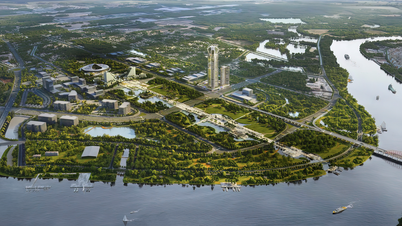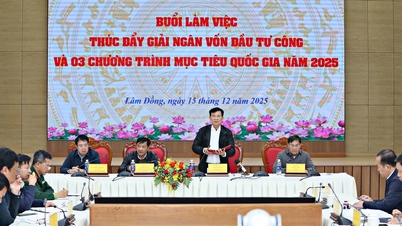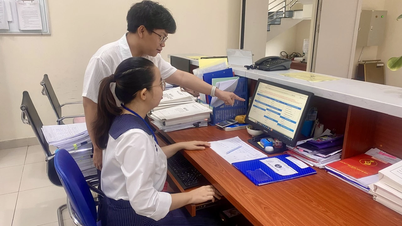
The task of reorganizing the administrative apparatus and units, especially the reorganization of district and commune-level administrative units, is a major policy with strategic significance in streamlining the apparatus and improving the effectiveness and efficiency of management. However, this process is and will give rise to significant challenges in the field of handling administrative procedures.
Specifically, changes in administrative boundaries, names, and related regulations have confused citizens and businesses, leading to a surge in inquiries and administrative procedures. Furthermore, in the context of downsizing the workforce, officials and civil servants must simultaneously adapt to new operational procedures and handle the increased volume of paperwork, creating significant pressure and increasing the risk of delays and errors.
To effectively address these challenges, ensure a smooth and transparent restructuring process, minimize inconvenience for citizens and businesses, and optimize administrative resources, Vietnam Post and Telecommunications Group (VNPT) has developed specialized AI applications to support efficient administrative procedure processing during the transition period.
"Personalized" services for citizens and businesses.
"Citizen-Business Virtual Assistant" is an integrated AI platform that acts as a single, intelligent digital touchpoint, providing comprehensive support to citizens and businesses on all administrative procedures arising from the merger process.
With its 24/7 automated information answering function, this application uses natural language processing (NLP) technology to understand and accurately and instantly answer thousands of questions from citizens and businesses about new administrative boundaries, name changes, and necessary document adjustments (household registration, citizen identification card, business license, land use right certificate, etc.). The application also provides information on new policies and regulations arising after mergers in an easy-to-understand and personalized way for each case.
On the other hand, based on the information provided by the user (type of document to be changed, old/new address, type of business), AI will automatically identify the administrative procedures to be performed and provide detailed step-by-step instructions on which documents to prepare. It will also provide direct links to the electronic forms to be filled out, and even assist in automatically filling in part of the information if the data is already available from the national database, minimizing errors and saving time for citizens.
This AI system also automatically collects, analyzes, and updates the latest legal documents and announcements from ministries, departments, and localities related to mergers, ensuring that information is always accurate and timely for citizens and businesses.
Thanks to these functions, the AI application "Citizen-Business Virtual Assistant" will significantly reduce the burden of direct question-and-answer sessions for officials responsible for handling administrative procedures, freeing up their time to focus on processing complex files requiring in-depth evaluation.
The application also helps improve the satisfaction and experience of citizens and businesses, enabling them to proactively search for information and carry out administrative procedures anytime, anywhere, minimizing waiting times and travel, and creating transparency and trust. In particular, the application ensures the consistency and accuracy of information, limiting situations where different places provide different interpretations, causing confusion, and creating fairness for all parties.
AI assists in processing administrative procedures.
VNPT has also developed a series of AI applications deeply integrated into the administrative procedure processing system to help officials and civil servants handle administrative procedures more efficiently during the transition period.
First, there is the AI system that supports intelligent document classification and verification. These AIs use "computer vision" technology to automatically scan, recognize, and read information from various types of documents and files; automatically classify files, extract data, and check their validity according to the new regulations and forms of the merged administrative unit; then, automatically alert about deficiencies, discrepancies, or invalid files, helping officials detect problems early and request timely supplementation, reducing the rate of returned files.
Next, AI assists in decision-making and document processing. This AI analyzes data from documents, compares it with relevant regulations, and suggests solutions or next steps for officials. In complex cases, the AI can highlight points to note or provide relevant legal documents for officials to refer to, expediting the review process.
Finally, there are AI-powered automated reporting and statistics. Accordingly, the application will automatically compile data from the process of receiving and handling administrative procedures (number of files, average processing time, most frequently occurring types of administrative procedures, common errors, etc.).
This generates visual, real-time statistical reports, giving local leaders and departments a comprehensive view of the effectiveness of administrative procedures, making it easier to identify bottlenecks and provide timely guidance and direction.
Real-world test results show that these AI systems have significantly improved the productivity of officials, reducing manual, repetitive, and error-prone tasks, allowing officials to focus on their professional duties and solve more complex problems; ensuring transparency and fairness in administrative procedures as processes are digitized and controlled by AI, minimizing subjective interference and negative risks; and providing accurate and timely data for management, supporting grassroots and local leaders in making quick and effective operational decisions based on real-world data.
Experience modern, fast, and efficient digital administration.
The pilot program for applying AI to support administrative procedures in Ho Chi Minh City in May 2025 has yielded many positive results. Specifically: the time taken to receive and respond to applications has been significantly reduced; citizens and businesses receive more accurate support, reducing the need for multiple trips; and officials have gained additional tools to process applications more proactively and efficiently.
Accordingly, the AI system has supported the processing of an average of 10,000-13,000 applications submitted directly by citizens each day, saving an estimated 1,400 hours per day, over 30,800 hours per month, and 369,600 hours per year in processing time, equivalent to the work of approximately 175 officials.
In addition, AI applications also support the processing of an average of 5,000-6,000 online applications per day, saving an estimated 550 hours per day, 12,100 hours per month, and 145,200 hours per year in processing time, equivalent to the work of nearly 70 officials.
Furthermore, when citizens and businesses monitor the progress of administrative procedures, they can look up and display their information on the ChatBot transaction platform, enhancing the overall experience. The application of AI to the Public Service Portal and the Administrative Procedure Resolution Information System has optimized processes, reduced waiting times and processing costs, and ensured fast, transparent, and dedicated service to the public.
For VNPT, AI is not just a trend, but a long-term strategy that was launched very early on. VNPT understands that mastering AI technology cannot be achieved through hasty actions; it requires systematic, sustainable, and visionary investment. VNPT has clearly identified three pillars that need investment: people, infrastructure, and data. For AI to truly develop, funding alone is not enough; flexible mechanisms, special policies, and a determined commitment to action are also necessary.
The AI technologies developed by VNPT are packaged into specific products and services, tightly integrated into the digital ecosystem being deployed for the government, citizens, and businesses. It is thanks to this "do-it-do" process that VNPT's AI technology is constantly improving, and its AI personnel are becoming increasingly mature.
According to THAI LINH/Nhan Dan Newspaper
Link to the original articleSource: https://baovanhoa.vn/nhip-song-so/ung-dung-ai-nang-cao-hieu-qua-giai-quyet-thu-tuc-hanh-chinh-143013.html





![[Photo] Two flights successfully landed and took off at Long Thanh Airport.](/_next/image?url=https%3A%2F%2Fvphoto.vietnam.vn%2Fthumb%2F1200x675%2Fvietnam%2Fresource%2FIMAGE%2F2025%2F12%2F15%2F1765808718882_ndo_br_img-8897-resize-5807-jpg.webp&w=3840&q=75)


































































































Comment (0)